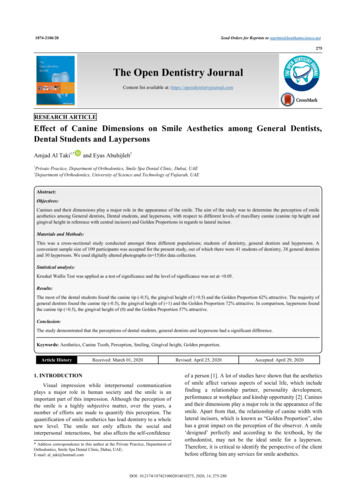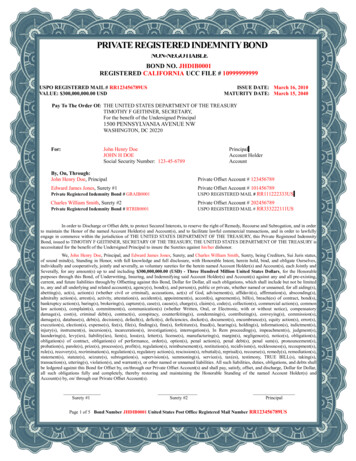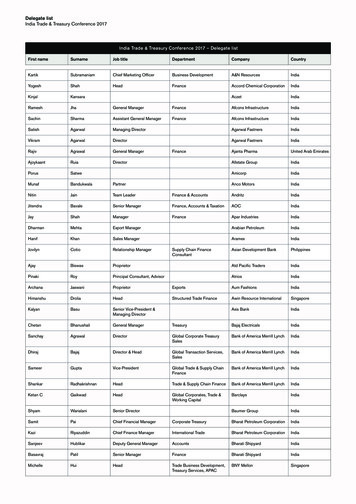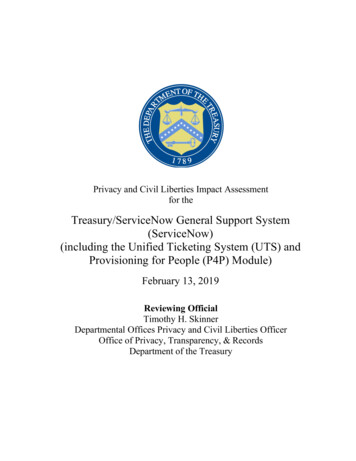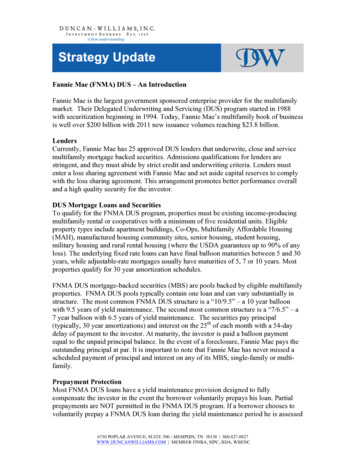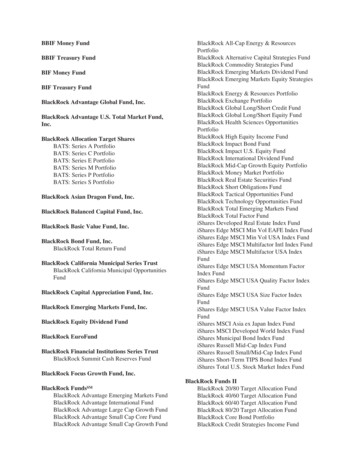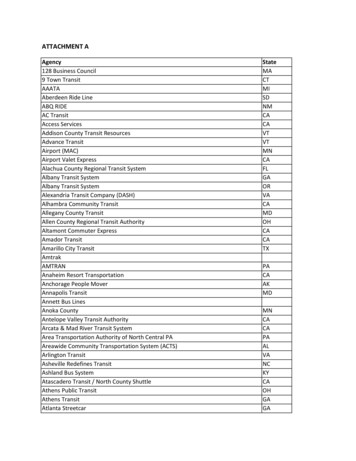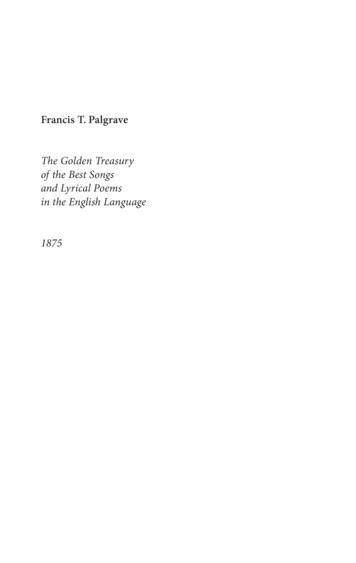
Transcription
Francis T. PalgraveThe Golden Treasuryof the Best Songsand Lyrical Poemsin the English Language1875
1.T. NashSpringSPRING, the sweet Spring, is the year’s pleasant king;Then blooms each thing, then maids dance in a ring,Cold doth not sting, the pretty birds do sing,Cuckoo, jug-jug, pu-we, to-witta-woo!The palm and may make country houses gay,Lambs frisk and play, the shepherds pipe all day,And we hear aye birds tune this merry lay,Cuckoo, jug-jug, pu-we, to-witta-woo.The fields breathe sweet, the daisies kiss our feet,Young lovers meet, old wives a-sunning sit,In every street these tunes our ears do greet,Cuckoo, jug-jug, pu-we, to-witta-woo!Spring! the sweet Spring!
42.W. Drummond of HawthorndenSummons to LovePHOEBUS, arise!And paint the sable skiesWith azure, white, and red:Rouse Memnon’s mother from her Tithon’s bedThat she may thy career with roses spread:The nightingales thy coming each-where sing:Make an eternal Spring!Give life to this dark world which lieth dead;Spread forth thy golden hairIn larger locks than thou wast wont before,And emperor-like decoreWith diadem of pearl thy temples fair:Chase hence the ugly nightWhich serves but to make dear thy glorious light—This is that happy mornThat day, long-wishéd dayOf all my life so dark,(If cruel stars have not my ruin swornAnd fates my hopes betray),Which, purely white, deservesAn everlasting diamond should it mark.This is the morn should bring unto this groveMy Love, to hear and recompense my love.Fair King, who all preserves,But show thy blushing beams,And thou two sweeter eyesShalt see than those which by Peneus’ streams
5Did once thy heart surprise.Now, Flora, deck thyself in fairest guise:If that ye winds would hearA voice surpassing far Amphion’s lyre,Your furious chiding stay;Let Zephyr only breathe,And with her tresses play.—The winds all silent are,And Phoebus in his chairEnsaffroning sea and airMakes vanish every star:Night like a drunkard reelsBeyond the hills, to shun his flaming wheels:The fields with flowers are deck’d in every hue,The clouds with orient gold spangle their blue;Here is the pleasant place—And nothing wanting is, save She, alas!
63.W. ShakespeareTime and Love1WHEN I have seen by Time’s fell hand defacedThe rich proud cost of outworn buried age;When sometime lofty towers I see down-razed,And brass eternal slave to mortal rage;When I have seen the hungry ocean gainAdvantage on the kingdom of the shore,And the firm soil win of the watery main,Increasing store with loss, and loss with store;When I have seen such interchange of state,Or state itself confounded to decay,Ruin hath taught me thus to ruminate—That Time will come and take my Love away:—This thought is as a death, which cannot chooseBut weep to have that which it fears to lose.
74.W. Shakespeare“Since brass, nor stone, nor earth, nor boundless sea”2SINCE brass, nor stone, nor earth, nor boundless sea,But sad mortality o’ersways their power,How with this rage shall beauty hold a plea,Whose action is no stronger than a flower?O how shall summer’s honey breath hold outAgainst the wreckful siege of battering days,When rocks impregnable are not so stoutNor gates of steel so strong, but Time decays?O fearful meditation! where, alack!Shall Time’s best jewel from Time’s chest lie hid?Or what strong hand can hold his swift foot back,Or who his spoil of beauty can forbid?O! none, unless this miracle have might,That in black ink my love may still shine bright.
85.C. MarloweThe Passionate Shepherd to His LoveCOME live with me and be my Love,And we will all the pleasures proveThat hills and valleys, dale and field,And all the craggy mountains yield.There will we sit upon the rocksAnd see the shepherds feed their flocks,By shallow rivers, to whose fallsMelodious birds sing madrigals.There will I make thee beds of rosesAnd a thousand fragrant posies,A cap of flowers, and a kirtleEmbroider’d all with leaves of myrtle.A gown made of the finest woolWhich from our pretty lambs we pull,Fair linéd slippers for the cold,With buckles of the purest gold.A belt of straw and ivy budsWith coral clasps and amber studs:And if these pleasures may thee move,Come live with me and be my Love.Thy silver dishes for thy meatAs precious as the gods do eat,Shall on an ivory table bePrepared each day for thee and me.
9The shepherd swains shall dance and singFor thy delight each May-morning:If these delights thy mind may move,Then live with me and be my Love.
106.W. ShakespeareA MadrigalCRABBED Age and YouthCannot live together:Youth is full of pleasance,Age is full of care;Youth like summer morn,Age like winter weather,Youth like summer brave,Age like winter bare;Youth is full of sport,Age’s breath is short,Youth is nimble, Age is lame;Youth is hot and bold,Age is weak and cold,Youth is wild, and Age is tame:—Age, I do abhor thee;Youth, I do adore thee:O! my Love, my Love is young!Age, I do defy thee—O sweet shepherd, hie thee,For methinks thou stay’st too long.
117.W. Shakespeare“Under the greenwood tree”UNDER the greenwood treeWho loves to lie with me,And tune his merry noteUnto the sweet bird’s throat—Come hither, come hither, come hither!Here shall he seeNo enemyBut winter and rough weather.Who doth ambition shunAnd loves to live i’ the sun,Seeking the food he eatsAnd pleased with what he gets—Come hither, come hither, come hither!Here shall he seeNo enemyBut winter and rough weather.
128.W. Shakespeare“It was a lover and his lass”IT was a lover and his lassWith a hey and a ho, and a hey nonino!That o’er the green cornfield did passIn the spring time, the only pretty ring time,When birds do sing hey ding a ding:Sweet lovers love the Spring.Between the acres of the ryeThese pretty country folks would lie:This carol they began that hour,How that life was but a flower:And therefore take the present timeWith a hey and a ho, and a hey nonino!For love is crownéd with the primeIn spring time, the only pretty ring time,When birds do sing hey ding a ding:Sweet lovers love the Spring.
139.AnonymousPresent in AbsenceABSENCE, hear thou my protestationAgainst thy strength,Distance, and length;Do what thou canst for alteration:For hearts of truest mettleAbsence doth join, and Time doth settle.Who loves a mistress of such quality,He soon hath foundAffection’s groundBeyond time, place, and all mortality.To hearts that cannot varyAbsence is Presence, Time doth tarry.By absence this good means I gain,That I can catch her,Where none can watch her,In some close corner of my brain:There I embrace and kiss her;And so I both enjoy and miss her.
1410.W. ShakespeareAbsenceBEING your slave, what should I do but tendUpon the hours and times of your desire?I have no precious time at all to spendNor services to do, till you require:Nor dare I chide the world-without-end-hourWhilst I, my sovereign, watch the clock for you,Nor think the bitterness of absence sourWhen you have bid your servant once adieu:Nor dare I question with my jealous thoughtWhere you may be, or your affairs suppose,But like a sad slave, stay and think of noughtSave, where you are, how happy you make those;—So true a fool is Love, that in your willThough you do anything, he thinks no ill.
1511.W. Shakespeare“How like a winter hath my absence been”HOW like a winter hath my absence beenFrom Thee, the pleasure of the fleeting year!What freezings have I felt, what dark days seen,What old December’s bareness everywhere!And yet this time removed was summer’s time:The teeming autumn, big with rich increase,Bearing the wanton burden of the primeLike widow’d wombs after their lords’ decease:Yet this abundant issue seem’d to meBut hope of orphans, and unfather’d fruit;For summer and his pleasures wait on thee,And, thou away, the very birds are mute;Or if they sing, ’tis with so dull a cheer,That leaves look pale, dreading the winter’s near.
1612.W. ShakespeareA ConsolationWHEN in disgrace with fortune and men’s eyesI all alone beweep my outcast state,And trouble deaf heaven with my bootless cries,And look upon myself, and curse my fate;Wishing me like to one more rich in hope,Featured like him, like him with friends possest,Desiring this man’s art, and that man’s scope,With what I most enjoy contented least;Yet in these thoughts myself almost despising,Haply I think on Thee—and then my state,Like to the lark at break of day arisingFrom sullen earth, sings hymns at heaven’s gate;For thy sweet love remember’d, such wealth bringsThat then I scorn to change my state with kings.
1713.W. ShakespeareThe UnchangeableO NEVER say that I was false of heart,Though absence seem’d my flame to qualify;As easy might I from myself departAs from my soul, which in thy breast doth lie.That is my home of love; if I have ranged,Like him that travels, I return again,Just to the time, not with the time exchanged,So that myself bring water for my stain.Never believe, though in my nature reign’dAll frailties that besiege all kinds of blood,That it could so preposterously be stain’dTo leave for nothing all thy sum of good;For nothing this wide universe I call,Save thou, my rose: in it thou art my all.
1814.W. Shakespeare“To me, fair Friend, you never can be old”TO me, fair Friend, you never can be old,For as you were when first your eye I eyedSuch seems your beauty still. Three winters’ coldHave from the forests shook three summers’ pride;Three beauteous springs to yellow autumn turn’dIn process of the seasons have I seen,Three April perfumes in three hot Junes burn’d,Since first I saw you fresh, which yet are green.Ah! yet doth beauty, like a dial-hand,Steal from his figure, and no pace perceived;So your sweet hue, which methinks still doth stand,Hath motion, and mine eye may be deceived:For fear of which, hear this, thou age unbred,—Ere you were born, was beauty’s summer dead.
1915.H. ConstableDiapheniaDIAPHENIA like the daffadowndilly,White as the sun, fair as the lily,Heigh ho, how I do love thee!I do love thee as my lambsAre belovéd of their dams;How blest were I if thou wouldst prove me.Diaphenia like the spreading roses,That in thy sweets all sweets encloses,Fair sweet, how I do love thee!I do love thee as each flowerLoves the sun’s life-giving power;For dead, thy breath to life might move me.Diaphenia like to all things blessédWhen all thy praises are expresséd,Dear joy, how I do love thee!As the birds do love the spring,Or the bees their careful king:Then in requite, sweet virgin, love me!
2016.T. LodgeRosalineLIKE to the clear in highest sphereWhere all imperial glory shines,Of selfsame colour is her hairWhether unfolded, or in twines:Heigh-ho, fair Rosaline!Her eyes are sapphires set in snow,Resembling heaven by every wink;The Gods do fear whenas they glow,And I do tremble when I thinkHeigh-ho, would she were mine!Her cheeks are like the blushing cloudThat beautifies Aurora’s faceOr like the silver crimson shroudThat Phoebus’ smiling looks doth grace;Heigh-ho, fair Rosaline!Her lips are like two budded rosesWhom ranks of lilies neighbour nigh,Within which bounds she balm enclosesApt to entice a deity:Heigh-ho, would she were mine!Her neck is like a stately towerWhere Love himself imprison’d lies,To watch for glances every hourFrom her divine and sacred eyes:Heigh-ho, for Rosaline!Her paps are centres of delight,Her breasts are orbs of heavenly frame,
21Where Nature moulds the dew of lightTo feed perfection with the same:Heigh-ho, would she were mine!With orient pearl, with ruby red,With marble white, with sapphire blueHer body every way is fed,Yet soft in touch and sweet in view:Heigh-ho, fair Rosaline!Nature herself her shape admires;The Gods are wounded in her sight;And Love forsakes his heavenly firesAnd at her eyes his brand doth light:Heigh-ho, would she were mine!Then muse not, Nymphs, though I bemoanThe absence of fair Rosaline,Since for a fair there’s fairer none,Nor for her virtues so divine:Heigh-ho, fair Rosaline;Heigh-ho, my heart! would God that she were mine!
2217.The Shepherd TonieColinBEAUTY sat bathing by a springWhere fairest shades did hide her;The winds blew calm, the birds did sing,The cool streams ran beside her.My wanton thoughts enticed mine eyeTo see what was forbidden;But better memory said, fie!So vain desire was chidden:—Hey nonny nonny O!Hey nonny nonny!Into a slumber then I fell,When fond imaginationSeeméd to see, but could not tellHer feature or her fashion.But ev’n as babes in dreams do smile,And sometimes fall a-weeping,So I awaked, as wise this whileAs when I fell a-sleeping:—Hey nonny nonny O!Hey nonny nonny!
2318.W. ShakespeareTo His Love1SHALL I compare thee to a summer’s day?Thou art more lovely and more temperate:Rough winds do shake the darling buds of May,And summer’s lease hath all too short a date;Sometime too hot the eye of heaven shines,And often is his gold complexion dimm’d;And every fair from fair sometime declines,By chance, or nature’s changing course, untrimm’d.But thy eternal summer shall not fade,Nor lose possession of that fair thou owest;Nor shall Death brag thou wanderest in his shade,When in eternal lines to time thou growest:—So long as men can breathe, or eyes can see,So long lives this, and this gives life to thee.
2419.W. Shakespeare“When in the chronicle of wasted time”2WHEN in the chronicle of wasted timeI see descriptions of the fairest wights,And beauty making beautiful old rhymeIn praise of ladies dead, and lovely knights;Then in the blazon of sweet beauty’s bestOf hand, of foot, of lip, of eye, of brow,I see their antique pen would have exprestEv’n such a beauty as you master now.So all their praises are but propheciesOf this our time, all, you prefiguring;And for they look’d but with divining eyes,They had not skill enough your worth to sing:For we, which now behold these present days,Have eyes to wonder, but lack tongues to praise.
2520.W. ShakespeareLove’s PerjuriesON a day, alack the day!Love, whose month is ever May,Spied a blossom passing fairPlaying in the wanton air:Through the velvet leaves the wind,All unseen, ’gan passage find;That the lover, sick to death,Wish’d himself the heaven’s breath.Air, quoth he, thy cheeks may blow;Air, would I might triumph so!But, alack, my hand is swornNe’er to pluck thee from thy thorn:Vow, alack, for youth unmeet;Youth so apt to pluck a sweet.Do not call it sin in meThat I am forsworn for thee:Thou for whom Jove would swearJuno but an Ethiope were,And deny himself for Jove,Turning mortal for thy love.
2621.Sir T. WyattA SupplicationFORGET not yet the tried intentOf such a truth as I have meant;My great travail so gladly spent,Forget not yet!Forget not yet when first beganThe weary life ye know, since whanThe suit, the service none tell can;Forget not yet!Forget not yet the great assays,The cruel wrong, the scornful ways,The painful patience in delays,Forget not yet!Forget not! O, forget not thisHow long ago hath been, and isThe mind that never meant amiss—Forget not yet!Forget not then thine own approvedThe which so long hath thee so loved,Whose steadfast faith yet never moved—Forget not this!
2722.W. Alexander, Earl of SterlineTo AuroraO IF thou knew’st how thou thyself dost harm,And dost prejudge thy bliss, and spoil my rest,Then thou wouldst melt the ice out of thy breast,And thy relenting heart would kindly warm.O if thy pride did not our joys controul,What world of loving wonders shouldst thou see!For if I saw thee once transform’d in me,Then in thy bosom I would pour my soul;Then all my thoughts should in thy visage shine;And if that aught mischanced, thou shouldst not moanNor bear the burthen of thy griefs alone;No, I would have my share in what were thine:And whilst we thus should make our sorrows one,This happy harmony would make them none.
2823.W. ShakespeareMan’s LoveLET me not to the marriage of true mindsAdmit impediments. Love is not loveWhich alters when it alteration finds,Or bends with the remover to remove:—O no! it is an ever-fixéd markThat looks on tempests, and is never shaken;It is the star to every wandering bark,Whose worth’s unknown, although his height be taken.Love’s not Time’s fool, though rosy lips and cheeksWithin his bending sickle’s compass come;Love alters not with his brief hours and weeks,But bears it out ev’n to the edge of doom:—If this be error, and upon me proved,I never writ, nor no man ever loved.
2924.Sir P. SidneyA DittyMY true-love hath my heart, and I have his,By just exchange one to the other given:I hold his dear, and mine he cannot miss,There never was a better bargain driven:My true-love hath my heart, and I have his.His heart in me keeps him and me in one,My heart in him his thoughts and senses guides:He loves my heart, for once it was his own,I cherish his because in me it bides:My true-love hath my heart, and I have his.
3025.J. SylvesterLove’s OmnipresenceWERE I as base as is the lowly plain,And you, my Love, as high as heaven above,Yet should the thoughts of me your humble swainAscend to heaven, in honour of my Love.Were I as high as heaven above the plain,And you, my Love, as humble and as lowAs are the deepest bottoms of the main,Whereso’er you were, with you my love should go.Were you the earth, dear Love, and I the skies,My love should shine on you like to the sun,And look upon you with ten thousand eyesTill heaven wax’d blind, and till the world were done.Whereso’er I am, below, or else above you,Whereso’er you are, my heart shall truly love you.
3126.W. ShakespeareCarpe DiemO MISTRESS mine, where are you roaming?O stay and hear! your true-love’s comingThat can sing both high and low;Trip no further, pretty sweeting,Journeys end in lovers meeting—Every wise man’s son doth know.What is love? ’tis not hereafter;Present mirth hath present laughter;What’s to come is still unsure:In delay there lies no plenty,—Then come kiss me, Sweet-and-twenty,Youth’s a stuff will not endure.
3227.W. ShakespeareWinterWHEN icicles hang by the wallAnd Dick the shepherd blows his nail,And Tom bears logs into the hall,And milk comes frozen home in pail;When blood is nipt, and ways be foul,Then nightly sings the staring owlTu-whoo!Tu-whit! tu-whoo! A merry note!While greasy Joan doth keel the pot.When all around the wind doth blow,And coughing drowns the parson’s saw,And birds sit brooding in the snow,And Marian’s nose looks red and raw;When roasted crabs hiss in the bowl—Then nightly sings the staring owlTu-whoo!Tu-whit! tu-whoo! A merry note!While greasy Joan doth keel the pot.
3328.W. Shakespeare“That time of year thou may’st in me behold”THAT time of year thou may’st in me beholdWhen yellow leaves, or none, or few, do hangUpon those boughs which shake against the cold,Bare ruin’d choirs, where late the sweet birds sang:In me thou see’st the twilight of such dayAs after sunset fadeth in the west,Which by-and-by black night doth take away,Death’s second self, that seals up all in rest:In me thou see’st the glowing of such fire,That on the ashes of his youth doth lieAs the death-bed whereon it must expire,Consumed with that which it was nourish’d by:—This thou perceiv’st, which makes thy love more strong,To love that well which thou must leave ere long.
3429.W. ShakespeareRemembranceWHEN to the sessions of sweet silent thoughtI summon up remembrance of things past,I sigh the lack of many a thing I sought,And with old woes new wail my dear time’s waste;Then can I drown an eye, unused to flow,For precious friends hid in death’s dateless night,And weep afresh love’s long-since-cancell’d woe,And moan the expense of many a vanish’d sight.Then can I grieve at grievances foregone,And heavily from woe to woe tell o’erThe sad account of fore-bemoanéd moan,Which I new pay as if not paid before:—But if the while I think on thee, dear friend,All losses are restored, and sorrows end.
3530.W. ShakespeareRevolutionsLIKE as the waves make towards the pebbled shoreSo do our minutes hasten to their end;Each changing place with that which goes before,In sequent toil all forwards do contend.Nativity, once in the main of light,Crawls to maturity, wherewith being crown’d,Crooked eclipses ’gainst his glory fight,And Time that gave, doth now his gift confound.Time doth transfix the flourish set on youth,And delves the parallels in beauty’s brow;Feeds on the rarities of nature’s truth,And nothing stands but for his scythe to mow:—And yet, to times in hope, my verse shall standPraising Thy worth, despite his cruel hand.
3631.W. Shakespeare“Farewell! thou art too dear for my possessing”FAREWELL ! thou art too dear for my possessing,And like enough thou know’st thy estimate:The charter of thy worth gives thee releasing;My bonds in thee are all determinate.For how do I hold thee but by thy granting?And for that riches where is my deserving?The cause of this fair gift in me is wanting,And so my patent back again is swerving.Thyself thou gav’st, thy own worth then not knowing,Or me, to whom thou gav’st it, else mistaking;So thy great gift, upon misprision growing,Comes home again, on better judgment making.Thus have I had thee as a dream doth flatter—In sleep, a king; but waking, no such matter.
3732.W. ShakespeareThe Life without PassionTHEY that have power to hurt, and will do none,That do not do the thing they most do show,Who, moving others, are themselves as stone,Unmovéd, cold, and to temptation slow,—They rightly do inherit heaven’s graces,And husband nature’s riches from expense;They are the lords and owners of their faces,Others, but stewards of their excellence.The summer’s flower is to the summer sweet,Though to itself it only live and die;But if that flower with base infection meet,The basest weed outbraves his dignity:For sweetest things turn sourest by their deeds;Lilies that fester smell far worse than weeds.
3833.Sir T. WyattThe Lover’s AppealAND wilt thou leave me thus?Say nay! say nay! for shameTo save thee from the blameOf all my grief and grame.And wilt thou leave me thus?Say nay! say nay!And wilt thou leave me thus,That hath loved thee so longIn wealth and woe among:And is thy heart so strongAs for to leave me thus?Say nay! say nay!And wilt thou leave me thus,That hath given thee my heartNever for to departNeither for pain nor smart:And wilt thou leave me thus?Say nay! say nay!And wilt thou leave me thus,And have no more pityOf him that loveth thee?Alas! thy cruelty!And wilt thou leave me thus?Say nay! say nay!
3934.R. BarnefieldThe NightingaleAS it fell upon a dayIn the merry month of May,Sitting in a pleasant shadeWhich a grove of myrtles made,Beasts did leap and birds did sing,Trees did grow and plants did spring;Every thing did banish moanSave the Nightingale alone.She, poor bird, as all forlorn,Lean’d her breast against a thorn,And there sung the dolefullest dittyThat to hear it was great pity.Fie, fie, fie, now would she cry;Teru, teru, by-and-by:That to hear her so complainScarce I could from tears refrain;For her griefs so lively shownMade me think upon mine own.—Ah, thought I, thou mourn’st in vain,None takes pity on thy pain:Senseless trees, they cannot hear thee,Ruthless beasts, they will not cheer thee;King Pandion, he is dead,All thy friends are lapp’d in lead:All thy fellow birds do singCareless of thy sorrowing:Even so, poor bird, like theeNone alive will pity me.
4035.S. Daniel“Care-charmer Sleep, son of the sable Night”CARE CHARMER Sleep, son of the sable Night,Brother to Death, in silent darkness born,Relieve my languish, and restore the light;With dark forgetting of my care return.And let the day be time enough to mournThe shipwreck of my ill-adventured youth;Let waking eyes suffice to wail their scorn,Without the torment of the night’s untruth.Cease, dreams, the images of day-desires,To model forth the passions of the morrow;Never let rising Sun approve you liars,To add more grief to aggravate my sorrow:Still let me sleep, embracing clouds in vain,And never wake to feel the day’s disdain.
4136.W. ShakespeareMadrigalTAKE, O take those lips awayThat so sweetly were forsworn,And those eyes, the break of day,Lights that do mislead the morn:But my kisses bring again,Bring again—Seals of love, but seal’d in vain,Seal’d in vain!
4237.M. DraytonLove’s FarewellSINCE there’s no help, come let us kiss and part,—Nay I have done, you get no more of me;And I am glad, yea, glad with all my heart,That thus so cleanly I myself can free.Shake hands for ever, cancel all our vows;And when we meet at any time again,Be it not seen in either of our browsThat we one jot of former love retain.Now at the last gasp of love’s latest breath,When his pulse failing, passion speechless lies,When faith is kneeling by his bed of death,And innocence is closing up his eyes,—Now if thou wouldst, when all have given him over,From death to life thou mightst him yet recover!
4338.W. DrummondTo His LuteMY lute, be as thou wert when thou didst growWith thy green mother in some shady grove,When immelodious winds but made thee move,And birds their ramage did on thee bestow.Since that dear Voice which did thy sounds approve,Which wont in such harmonious strains to flow,Is reft from Earth to tune those spheres above,What art thou but a harbinger of woe?Thy pleasing notes be pleasing notes no more,But orphans’ wailings to the fainting ear;Each stroke a sigh, each sound draws forth a tear;For which be silent as in woods before:Or if that any hand to touch thee deign,Like widow’d turtle, still her loss complain.
4439.W. ShakespeareBlind LoveO ME ! what eyes hath Love put in my headWhich have no correspondence with true sight;Or if they have, where is my judgment fledThat censures falsely what they see aright?If that be fair whereon my false eyes dote,What means the world to say it is not so?If it be not, then Love doth well denoteLove’s eye is not so true as all men’s: No,How can it? O how can Love’s eye be true,That is so vex’d with watching and with tears?No marvel then though I mistake my view:The sun itself sees not till heaven clears.O cunning Love! with tears thou keep’st me blind,Lest eyes well-seeing thy foul faults should find!
4540.AnonymousThe Unfaithful ShepherdessWHILE that the sun with his beams hotScorchéd the fruits in vale and mountain,Philon the shepherd, late forgot,Sitting beside a crystal fountain,In shadow of a green oak treeUpon his pipe this song play’d he:Adieu, Love, adieu, Love, untrue Love,Untrue Love, untrue Love, adieu, Love;Your mind is light, soon lost for new love.So long as I was in your sightI was your heart, your soul, and treasure;And evermore you sobb’d and sigh’dBurning in flames beyond all measure:—Three days endur’d your love to me,And it was lost in other threeAdieu, Love, adieu, Love, untrue Love,Untrue Love, untrue Love, adieu, Love;Your mind is light, soon lost for new love.Another Shepherd you did seeTo whom your heart was soon enchainéd;Full soon your love was leapt from me,Full soon my place he had obtainéd.Soon came a third your love to win,And we were out and he was in.Adieu, Love, adieu, Love, untrue Love,Untrue Love, untrue Love, adieu, Love;Your mind is light, soon lost for new love.
46Sure you have made me passing gladThat you your mind so soon removéd,Before that I the leisure hadTo choose you for my best belovéd:For all your love was past and doneTwo days before it was begun:—Adieu, Love, adieu, Love, untrue Love,Untrue Love, untrue Love, adieu, Love;Your mind is light, soon lost for new love.
4741.E. Vere, Earl of OxfordA RenunciationIF women could be fair, and yet not fond,Or that their love were firm, not fickle still,I would not marvel that they make men bondBy service long to purchase their good will;But when I see how frail those creatures are,I muse that men forget themselves so far.To mark the choice they make, and how they change,How oft from Phoebus they do flee to Pan;Unsettled still, like haggards wild they range,These gentle birds that fly from man to man;Who would not scorn and shake them from the fist,And let them fly, fair fools, which way they list?Yet for disport we fawn and flatter both,To pass the time when nothing else can please,And train them to our lure with subtle oath,Till, weary of their wiles, ourselves we ease;And then we say when we their fancy try,To play with fools, O what a fool was I!
4842.W. Shakespeare“Blow, blow, thou winter wind”BLOW, blow, thou winter wind,Thou art not so unkindAs man’s ingratitude;Thy tooth is not so keenBecause thou art not seen,Although thy breath be rude.Heigh-ho! sing heigh-ho! unto the green holly:Most friendship is feigning, most loving mere folly:Then, heigh-ho! the holly!This life is most jolly.Freeze, freeze, thou bitter sky,Thou dost not bite so nighAs benefits forgot:Though thou the waters warp,Thy sting is not so sharpAs friend remember’d not.Heigh-ho! sing heigh-ho! unto the green holly:Most friendship is feigning, most loving mere folly:Then, heigh-ho! the holly!This life is most jolly.
4943.W. DrummondMadrigalMY thoughts hold mortal strife;I do detest my life,And with lamenting criesPeace to my soul to bringOft call that prince which here doth monarchize:—But he, grim grinning King,Who caitiffs scorns, and doth the blest surprise,Late having deck’d with beauty’s rose his tomb,Disdains to crop a weed, and will not come.
5044.W. ShakespeareDirge of LoveCOME away, come away, death,And in sad cypres let me be laid;Fly away, fly away, breath;I am slain by a fair cruel maid.My shroud of white, stuck all with yew,O prepare it!My part of death, no one so trueDid share it.Not a flower, not a flower sweetOn my black coffin let there be strown;Not a friend, not a friend greetMy poor corpse, where my bones shall be thrown:A thousand thousand sighs to save,Lay me, oh, whereSad true lover never find my grave,To weep there.
5145.W. ShakespeareFideleFEAR no more the heat o’ the sunNor the furious winter’s rages;Thou thy worldly task hast don
and Lyrical Poems in the English Language 1875. 1. T. Nash Spring SPRING, the sweet Spring, is the year’s pleasant king; Then blooms each thing, then maids dance in a ring, Cold doth not sting, the pretty birds do sing, Cuckoo, jug-jug, pu-we

